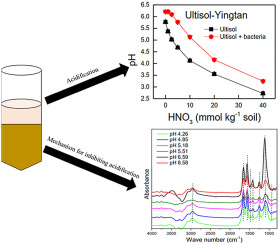Environmental Pollution ( IF 7.6 ) Pub Date : 2020-01-23 , DOI: 10.1016/j.envpol.2020.114049 Jackson Nkoh Nkoh 1 , Jing Yan 2 , Ren-Kou Xu 3 , Ren-Yong Shi 2 , Zhi-Neng Hong 2

|
Acidification in variable charge soils is on the rise due to increased acid deposition and use of nitrogenous fertilizers. The associated low pH and cation exchange capacity make the soils prone to depleted base cations and increased levels of Al3+. Consequently, Al toxicity to plants and soil infertility decrease crop yield. This study was designed to investigate the effect of Pseudomonas fluorescens on the acidification of two Ultisols. The simulated acidification experiment demonstrated that the pH of bacteria-treated soil was higher than that of control under similar conditions, suggesting that the adhered bacteria inhibited soil acidification. This observation was attributed to the association of organic anions (RCOO− or RO−) on bacteria with H+ to form neutral molecules (RCOOH or ROH) and reducing the activity of H+ in solution. The bacteria also inhibited the increase in soil soluble Al and exchangeable Al during soil acidification. The adhesion of bacteria on the soils increased soil effective cation exchange capacity (ECEC) and exchangeable base cations at each pH compared to control. The release of exchangeable base cations from bacteria-treated soil, and the decrease in soil ECEC and exchangeable base cations with decreasing pH confirmed that protonation of organic anions on adhered bacteria was mainly responsible for the inhibition of soil acidification. The change of zeta potential of the bacteria with pH and the ART-FTIR analysis at various pH provided more evidence for this mechanism. Therefore, the bacteria in variable charge soils played an important role in retarding soil acidification.
中文翻译:

粘附的荧光假单胞菌抑制可变电荷土壤酸化的机理。
由于增加的酸沉积和含氮肥料的使用,可变电荷土壤中的酸化正在上升。随之而来的低pH和阳离子交换能力使土壤易于消耗碱性阳离子并增加Al 3+的含量。因此,铝对植物的毒性和不育性降低了农作物的产量。本研究旨在研究荧光假单胞菌对两种Ultisol酸化的影响。模拟的酸化实验表明,在相似的条件下,细菌处理过的土壤的pH值高于对照,表明粘附的细菌抑制了土壤酸化。这一观察结果是由于有机阴离子(RCOO协会-或RO -)在具有H +的细菌上形成中性分子(RCOOH或ROH)并降低H +的活性在解决方案中。细菌还抑制了土壤酸化过程中土壤可溶性铝和可交换铝的增加。与对照相比,细菌在土壤上的附着力增加了每个pH下的土壤有效阳离子交换能力(ECEC)和可交换的碱性阳离子。从细菌处理过的土壤中释放出可交换的碱性阳离子,以及随着pH值的降低,土壤ECEC和可交换的碱性阳离子的减少证实,附着细菌上有机阴离子的质子化主要是抑制土壤酸化的原因。细菌的ζ电势随pH的变化以及在各种pH下的ART-FTIR分析为该机理提供了更多证据。因此,可变电荷土壤中的细菌在阻止土壤酸化中起着重要作用。











































 京公网安备 11010802027423号
京公网安备 11010802027423号